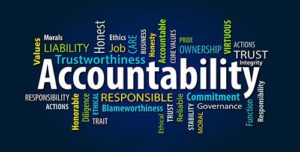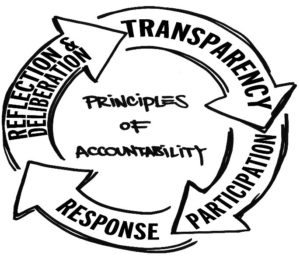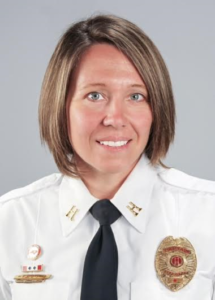By: Battalion Chief Marlene Kostyrka, Winston-Salem (NC) Fire Department
A recent conversation with a fire service colleague, has led me to examine accountability within the fire  service and the need for it. Yes, the dreaded word, accountability. It is not rocket science but we all need it and it is one of the earliest lesson we learn as children.
service and the need for it. Yes, the dreaded word, accountability. It is not rocket science but we all need it and it is one of the earliest lesson we learn as children.
You might see the word accountability and have an anxiety ridden reaction. Often, we relate this to repercussions, discipline, or “someone must have done something wrong.” The fact is that accountability sparks conversations, transparency, and can change stagnate organizational cultures. When employees are in positions where they can thrive, have clear expectations, and are held accountable, production can be maximized.
See Related: Responsibility, Authority, and Accountability are not Synonyms
Creating a culture where employees are accountable means that first; the leaders must be accountable to the employees. Information sharing, discussions about challenges, and allowing everyone to engage in the dialogue is the first step in starting the change. Everyone makes mistakes, the difference is what the individuals do after the mistake.
What We Can Learn from Social Media
Odd as it may seem, often Facebook and other social media outlets are great examples of positive  accountability. As a mom of four one of the things I like to do is brag about my children on the social platform. I am accountable to my friends and family that my post will reflect what they expect, a well-mannered, funny, yet innocent child moment. The comments all have a positive tone, my pride and head grow out of control.
accountability. As a mom of four one of the things I like to do is brag about my children on the social platform. I am accountable to my friends and family that my post will reflect what they expect, a well-mannered, funny, yet innocent child moment. The comments all have a positive tone, my pride and head grow out of control.
But what if I posted an out of control child with a multitude of inappropriate words coming out of their mouth? The reactions would be much different and those who are my friends, would probably ask why I put that on social network. I would be embarrassed and ashamed, which ultimately could force me to remove the post.
Seems simple, right?
So why can we not do this at work?
Making mistakes is not fun, but often it is considered the best way to learn the hard lessons and can lead to making better decisions in the future. That said, a major benefit of accountability is the opportunity to learn important lessons without going through the painful process of making the same old mistakes.
Accountability requires a deep understanding of cause and effect, which requires an exchange of words,  often face to face. If employees are unwilling to meet this challenge, then accountability within the organization will never happen.
often face to face. If employees are unwilling to meet this challenge, then accountability within the organization will never happen.
We have all been told to stop asking “why”, when in fact, that is what should be asked. Everyone views situations differently because of life experiences, knowledge, and education. This can lead to a powerful learning experience for all involved in the conversation.
Leaders of organizations, I challenge you to be personally responsible, engage in conversations, and integrate the value of external accountability. Be the giver and the receiver of dialog relating to accountability, become the change agent needed in your organization.
Be the leader you want the newest firefighter to be, set expectations, hold everyone accountable, and lead from the front. Talk to firefighters who have little experience and to those who have a wealth of knowledge. Embrace accountability in your every action and not just in a tactic.
About the Author
 Marlene Kostyrka is a Battalion Chief with the City of Winston-Salem Fire Department, in North Carolina. She has fifteen years of experience in the fire service having served as a volunteer firefighter before moving to Winston-Salem where she started as a firefighter and progressed to engineer and then captain.
Marlene Kostyrka is a Battalion Chief with the City of Winston-Salem Fire Department, in North Carolina. She has fifteen years of experience in the fire service having served as a volunteer firefighter before moving to Winston-Salem where she started as a firefighter and progressed to engineer and then captain.
Chief Kostyrka currently serves in the position of administrative chief working as the department’s Accreditation Manager. She holds many fire service certifications, has earned her Bachelor’s Degree in Fire Science and a Master’s Degree in Executive Fire Leadership and Disaster Preparedness. She enjoys spending time with her four children and husband of 19 years. Chief Kostyrka is currently a student in the Executive Fire Office Officer Program at the National Fire Academy.
Contact Chief Kostyrka at: [email protected]
 Fire & EMS Leader Pro The job of old firefighters is to teach young firefighters how to become old firefighters!
Fire & EMS Leader Pro The job of old firefighters is to teach young firefighters how to become old firefighters!